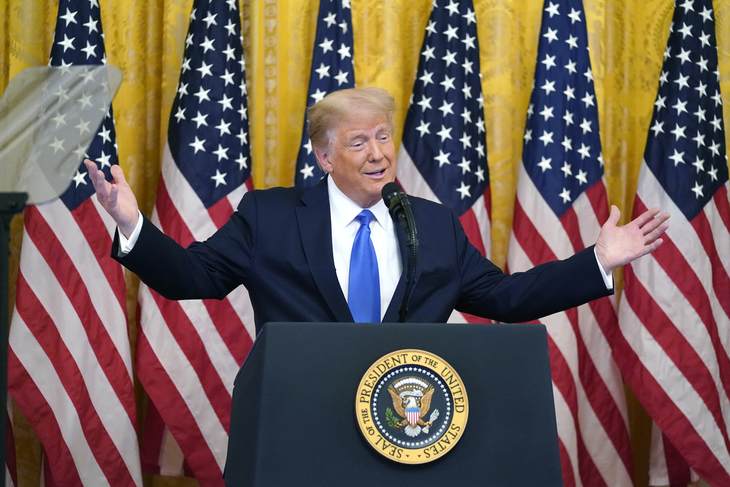President Trump Opens the Valve to Drain the Swamp With a New Executive Order

President Trump has signed an executive order that removes civil-service protections from certain positions within federal government agencies. There has been much whining and gnashing of teeth, but voters should be thrilled. Making policymakers in the Deep State “at-will” employees, who are easier to dismiss if they attempt to obstruct the duly elected president’s agenda, is a good thing. Not being bound to hire according to a career-progression ladder will also allow agencies to bring in new people with new ideas. This will be true whether or not Donald Trump is president.
The need to reduce protections within the civil service became apparent when training based on critical race theory was banned from the federal government. Within two weeks of the order, whistleblowers started to report that their scheduled critical race training would proceed—in direct violation of the order.
Many who made their careers in private industry were stunned. Any department head or manager who operates in direct defiance of an order from a CEO would not remain on the team for long. Yet when this happened in federal agencies, no one was apparently held accountable.
Office of Management and Budget Director Russell Vought explained why on Glenn Beck’s radio show:
BECK: I mean, this is insubordination. I mean, you are going against a presidential directive. If you can’t be fired for that, what can you be fired for?
VOUGHT: Not much, Glenn, to be honest with you, and that’s the rules and the laws that have been put in place. But we do have the ability to build a record of where individuals have not performed.
BECK: Unbelievable. Absolutely.
VOUGHT: And that is what we are looking at to the best of our ability.
BECK: This is, it’s unacceptable. I am not saying it is you, Russ, but this is unacceptable. I don’t know how the president accepts that. That should be priority number one—figuring out a way to be able to fire people or you’ll never get rid of the Deep State. If you can’t fire the people, that just sends a message to all of the other people who want to disagree with the president to do what they want.
At the time, I likened President Trump trying to stop the resistance to his agenda to a game of Whack-a-Mole. The administration would issue a strategy, policy direction, or order and then wait to see who slow-walked, ignored, or outright defied it. The administration would then correct the behavior with a “note to file” and little else.
In essence, these employees are defying the will of the electorate, no matter who the chief executive is. We elect our representatives based on our policy preferences. To be sure, the election of Donald Trump resulted in a significant change in foreign policy, immigration policy, and education policy. Administrative rules make changing policies and regulations arduous. Employees who are proud members of the #Resistance only make it more difficult.
For example, President Trump directed the government to reduce illegal immigration. The experts and civil servants in the appropriate agencies should determine how best to accomplish this. Debate on the “how” is important, but the debate on the “what” is over when the citizens elect the president. The problem arises when the president meets resistance on the “what.” The defiance of the critical race theory training ban was a glaring example.
Some critics are saying this decision will chill speech within the agencies, eliminating diverse points of view. This was not a problem during the fifteen years I spent in public and private companies in corporate America. Executives determined strategy and what needed to be accomplished, while managers and employees determined how to achieve the strategy.
As the new executive order is written, the agencies will have discretion on how it is implemented through crafting detailed rules. This includes determining which positions will become Schedule F as defined in the executive order. These positions will have fewer protections and won’t be subject to competitive hiring.
Private-sector unions make clear distinctions about what type of employee is protected by a union contract and which are not. Managers and employees with special education and training are generally not given the same employment protections and are considered at-will employees. There is no reason not to make similar distinctions in the public-sector positions within the government.
In a recent interview, Jared Kushner explained to Ben Shapiro how bringing business people into the government allowed the Trump administration to deliver on so many promises. They brought a results-orientation approach to the execution of the administration’s priorities. This mix has worked out well as the president approached projects like building the southern border wall using traditional project-management skills.
Bringing new perspectives and new skills into an ossified bureaucracy is an excellent idea. It will also make resistance to the will of the voters a risky proposition. At the end of the day, civil servants work for us, and it is high time they were reminded of that.
No comments:
Post a Comment